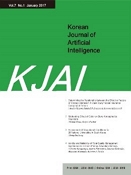- 권한신청
- E-ISSN2508-7894
- KCI
Development of Big Data-based Cardiovascular Disease Prediction Analysis Algorithm
Dong-Hun HAN (Department of Medical Artificial Intelligence, Eulji University)
Myung-Ae CHUNG (Department of BigData Medical Convergence, Eulji University)
Abstract
Recently, the rapid development of artificial intelligence technology, many studies are being conducted to predict the risk of heart disease in order to lower the mortality rate of cardiovascular diseases worldwide. This study presents exercise or dietary improvement contents in the form of a software app or web to patients with cardiovascular disease, and cardiovascular disease through digital devices such as mobile phones and PCs. LR, LDA, SVM, XGBoost for the purpose of developing "Life style Improvement Contents (Digital Therapy)" for cardiovascular disease care to help with management or treatment We compared and analyzed cardiovascular disease prediction models using machine learning algorithms. Research Results XGBoost. The algorithm model showed the best predictive model performance with overall accuracy of 80% before and after. Overall, accuracy was 80.0%, F1 Score was 0.77~0.79, and ROC-AUC was 80%~84%, resulting in predictive model performance. Therefore, it was found that the algorithm used in this study can be used as a reference model necessary to verify the validity and accuracy of cardiovascular disease prediction. A cardiovascular disease prediction analysis algorithm that can enter accurate biometric data collected in future clinical trials, add lifestyle management (exercise, eating habits, etc.) elements, and verify the effect and efficacy on cardiovascular-related bio-signals and disease risk. development, ultimately suggesting that it is possible to develop lifestyle improvement contents (Digital Therapy).
- keywords
- Bigdage Analysis, Cardiovescular Disease, Machine Learnling, Algorithm, XGBoost, Digital Therapy
- 다운로드 수
- 조회수
- 0KCI 피인용수
- 0WOS 피인용수














